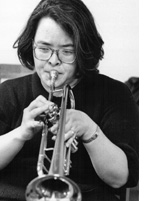
Fall 1998
![]()
Covering black holes, fossil worms, and a cure for cancer
![]()
![]()
Soundings is a publication of the School of Humanities and Social Science at MIT
Comments and questions to www-shss@mit.edu
Hidden gems: artist behind the desk
Bionic embouchure
 "When
I play the trumpet I sublimate myself to the music. I'm thinking about
blending 100 percent into the whole sound. I'm not multi-tasking - like
I am in my day-to-day work head, answering phones and helping students
in crisis," says Michèle
Oshima, coordinator
of the MIT Program in Women's Studies. "And it's all hard-wired - I don't
have to think: Play G sharp. Press down 2 and 3."
"When
I play the trumpet I sublimate myself to the music. I'm thinking about
blending 100 percent into the whole sound. I'm not multi-tasking - like
I am in my day-to-day work head, answering phones and helping students
in crisis," says Michèle
Oshima, coordinator
of the MIT Program in Women's Studies. "And it's all hard-wired - I don't
have to think: Play G sharp. Press down 2 and 3."
Endowed with what she calls a "bionic embouchure," Oshima can pick up her horn "without warming up and play with a wonderful tone with no problem. I get away with murder, in terms of [not] practicing. My friends are jealous," she says, erupting into her signature rat-tat cascade of laughter. With her mighty chops, Oshima lately finds herself playing more "firsts" - the horn section's coveted lead role, often featuring many hard-to-hit high notes. Her forte is melodic solos.
Classically trained from the age of 10, Oshima initially chose trumpet because "my older male cousins wouldn't let me touch their trumpet, while letting my younger brother." For the first four years she borrowed a neighbor's horn to practice; her parents wanted to make sure she was serious before investing in an instrument. Throughout elementary and high schools, Oshima played with concert bands, marching bands, brass quintets, and symphonies, often competitively. "If anything will make you a feminist," she explains, "it's surviving trumpet sections from grade school on. You can't imagine the ribbing that goes on. I was one of the best and I guess it was emasculating to the guys."
As a teenager, when she became increasingly serious about her music, her parents canceled her lessons; they were concerned when she contemplated switching from high school to conservatory, and were anxious that, down the road, a musician's life would prove too difficult.
These days, Oshima plays with several groups weekly, including the Dudley House Really Big Band, composed mostly of Harvard graduate students, including three other women trumpeters, the Longy Jazz Orchestra, and Jumbo, a hodge-podge group that encourages anyone, particularly non-musicians, to join the jamming. With a cult following, Jumbo puts a premium on fun over musicality. The result is "painful and raucous, chaos and cacophony, but hilarious and all in the spirit of good fun," says Oshima, who originally considered the music horrific, but is now "evolving, so I can appreciate it." Steeped in classical training, she was serious about musicality, accuracy of playing, dynamics, timing, and orchestration. It was an "uptight" approach, she says, which she is learning to shed.
Unrelentingly busy, Oshima has a breathless agenda of extracurricular activities: In addition to her weekly rehearsals, she races with and has organized the Dragon Boat Festival, an annual community event on the Charles River drawing 30,000 spectators; avidly supports theater, and is instrumental in linking playwrights, actors, directors, and theaters; has served on numerous nonprofit boards, including Asian Sisters in Action, Asian American Unity Dinner, Sojourner: the Women's Forum, and The Theater Offensive; and volunteers for Wellesley College, her alma mater. Downtime consists of reading - two or three novels a week.
Though she's beginning to cut back on some of her volunteering, Oshima is firm about keeping the horn in her life. "I can't imagine not playing the trumpet. It's such a fun outlet. Fun is an understatement - it's a soulful experience."
Artistic flair often resides in unexpected places. In our Artists Behind the Desk series, we profile the unsung artistry - visual arts, dance, music, theater, and poetry - found amidst the 350 faculty and staff of the School of Humanities and Social Science.